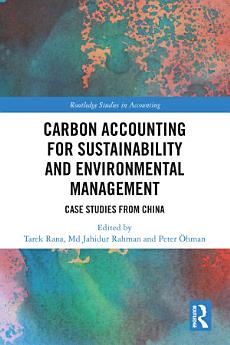Carbon Accounting for Sustainability and Environmental Management: Case Studies from China
About this ebook
It provides a comprehensive exploration of the subject, with a specific focus on the Chinese context and sheds light on how carbon accounting practices are being integrated into corporate and national strategies. While the book has a strong focus on empirical realities in China, its exploration of carbon accounting and environmental management holds international importance. The book bridges the gap between theory and practice, offering readers in-depth insights into the intricate dynamics of carbon accounting and its implications for sustainable development, drawing on data and case studies to provide practical insights into the effectiveness of various carbon accounting approaches and their impact on environmental sustainability. It focuses on the crucial role of the development of green accounting, its future growth, and its wider impact on climate change. Additionally, the book examines how accurate tracking and reporting of carbon emissions are integral to developing effective environmental strategies and evolving environmental policies. Accompanied by real-world case studies and actionable recommendations, this book is a valuable resource for anyone navigating the intricate landscape of carbon accounting and reporting, offering a road map to informed strategic decision-making and sustainable business practices.
It will be particularly beneficial for professionals in environmental management, policy formulation, and corporate sustainability, as it translates complex carbon accounting concepts into tangible, practical strategies.
About the author
Tarek Rana is an associate professor of accounting at RMIT University, Melbourne, Australia.
Md Jahidur Rahman is an assistant professor of accounting at Wenzhou-Kean University in Wenzhou, China.
Peter Öhman is a professor and head of business administration at Mid Sweden University, and director of Centre for research on Economic Relations (CER).




